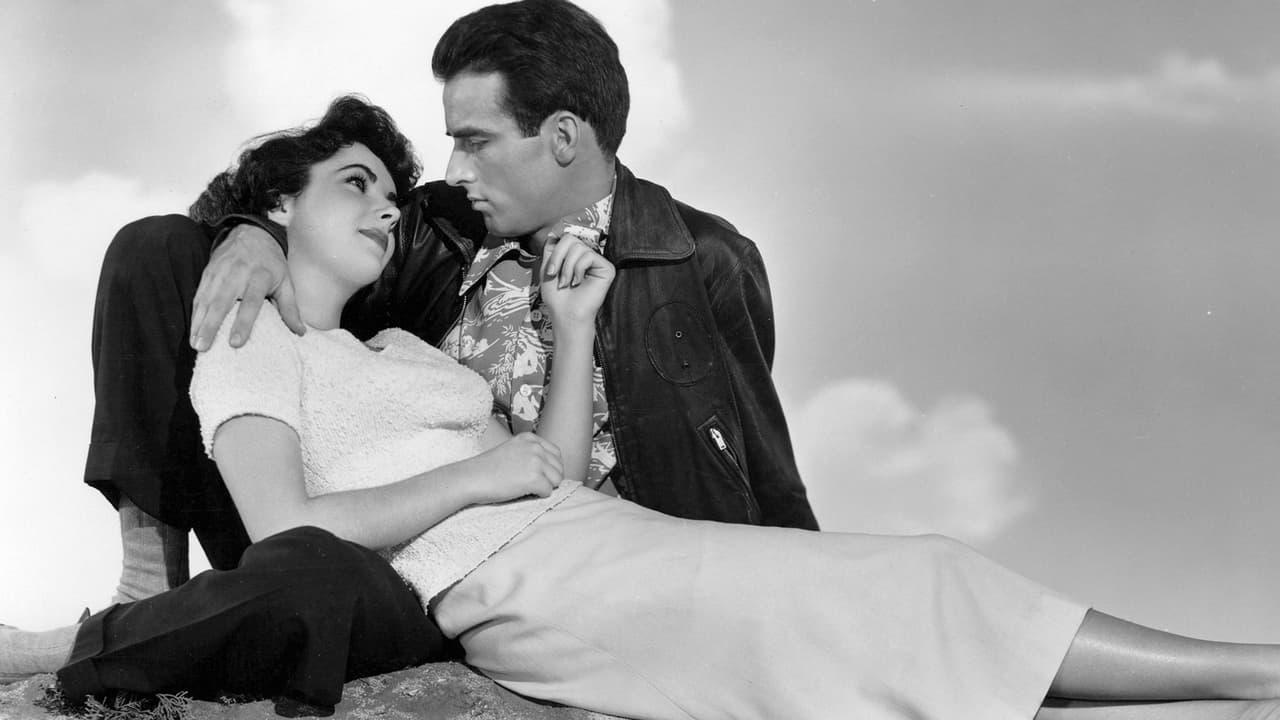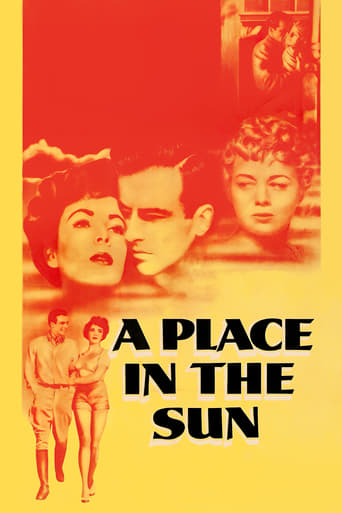

A Place in the Sun is one of the most beautiful, glamorous classic films of all time. Yes, there are epics like Gone with the Wind, but for quiet, black and white splendors, you'll be hard pressed to find a more beautiful film than A Place in the Sun.Montgomery Clift is a man in pursuit of the American Dream. He's a hard worker, but he can't quite shake where he comes from. In his loneliness, he enters into a relationship with Shelley Winters. She's common, and she knows she's not beautiful, so she's constantly afraid he'll leave her. Enter Elizabeth Taylor.Monty steps into the high-class world and falls in love with the lifestyle, the glamour, the freedom, and the girl. Liz is perfection, the apex of the American Dream. The only question is how badly does he want her? What will he do to get her? Screenwriters Harry Brown and Michael Wilson had their work cut out for them. The book was titled An American Tragedy and it was 900 pages. I've read the book, and I don't know how they sifted through the tome and still kept their sanity.Winner of Oscars in Directing, Cinematography, Costume Design, Editing, Original Score, and Adapted Screenplay, and nominated for Actor, Actress, and Picture, A Place in the Sun is a must-see classic. The tragic story stands the test of time beautifully, and it's always wonderful to watch gorgeous people in gorgeous clothes up on the big screen, set to a lovely score.
... View MoreWhat a sad movie!!!Almost a masterpiece...there are some little mistakes like on the radio talking about the weather and advising about the danger on the lake....George Stevens,Elizabeth Taylor and mainly Montgomery Clift in your best performance making a disturbing character between a normal life tight on marriage without love and rich and pleasant life with woman who really loves...that's the point...when the tragedy comes true reach the point of no return...based on real facts this remarkable story told with shadows under a bird singing on freezing lake...on a dark afternoon!!!
... View MoreGeorge Steven's high-calibre drama, a six-times Oscar winner (including BEST DIRECTOR and SCREENPLAY), is a tellingly puissant moral lesson adapted from Theodore Dreiser's novel, AN American TRAGEDY, inspired by real event. A working-class young man George Eastman (Clift), comes to town to work for his industrialist uncle Charles Eastman (Heyes), strives to fight for a better future, but begins to bog down into a dilemma when his low-class girlfriend Alice Tripp (Winters) gets pregnant and puts pressure on an immediate marriage, whilst a gorgeous socialite Angela Vickers (Taylor), whom he secretly admires, surprisingly reciprocates her affections.Any advice to solve George's dilemma? Not hindsight wisdom, yet the truth is, if that (highly uncommon) scenario would happen to anybody, under such a tempting circumstances, a rosy future with the perfect woman a man could ever dream of, the idea of dispatching the poor Alice would lurk around pretty certainly to any morally deficient social climbers, so despite the horrific act (Alice's pregnancy has never been put into foreground to exacerbate the crusade against George during the trial), we audience tends to sympathise with him, plus, the film intentionally omits what happened after the boat was capsized, in the eyes of viewers, it is an emotionally perturbed Alice herself causes the capsize of the boat at the first place, only in the court, George tries to re-enact what was happening then, even his side of story is scarcely credible, there is tiny possibility that he is "innocent", and what's more disturbing is that, subconsciously, we do hope he is!That's where lies the strength of this slow-burner, as George could be anything but "innocent", simply because even if he had not done anything to harm Alice, just lets it happen when a landlubber like her was drowning to her death, is another form of murder. He has the perfect motive, and his not-doing is exactly the helping hand to facilitate Alice's death.Why then, our commiserations are more inclining to George than to Alice, first of all, it is Montgomery Clift's unrivalled and wonderfully consistent performance, a misfit being ricocheted onto a wrong echelon, who awkwardness is painfully visible. Just when he decides to accept the reality to stay where he belongs, a windfall sweeps off his feet, which ensues a turbulent battle of human frailties and moral senses underneath of his humble physique and perpetually preoccupied minds. Mr. Clift even masks any edgy aspects of George's personality, to make his actions even more ambivalent, either he is a ruthless schemer putting on a masterful front to play meek and try to evade punishment, or he is a tragic character, passively devoured by the twist of fate. And even up until the final scene, we can not tell which one is the real George Eastman, in my book, that's a top-drawer achievement for the thespian.Secondly, Ms. Winters' Alice, exists more than just the unfortunate prey, when a woman has to literally blackmail her boyfriend with pregnancy into marrying her, apart from blaming an unjust social environment towards women, the truth is, they will never reach a happy ending, Alice is miserable but equally as selfish as George, bovine and unglamorous, the flagrant contrast between her and Angela, is another excuse for George's road-of-no-return. A trifle of misogyny and female objectification can be discerned, but in Ms. Winters' defence, she delivers a palpably soul- pulverising coup-de-maître, notably in the scene with the doctor to insinuate an abortion, and her final in-your-face accusation and hyperbole on the boat.There is a 16-year-old Elizabeth Taylor, a child star transmogrifies to a fabulous screen goddess overnight, her voice is crispy and untainted, so is her off-screen rapport and affection to Mr. Clift, mirroring Angela's undying love for George, an avatar of perfection too good to be true in reality, extant on the silver celluloid only. It is her angelic face and seductive kiss remain in George's last moments, something worth dying for in its literal meaning. Oscar-winner, the limelight-stealing character actress Anne Revere has a small cameo as George's religious mother, whose film career ended abruptly after this due to being on the infamous "Hollywood blacklist", which prompted a nearly 20-years gap of absence in her filmography.Mr. Stevens takes great patience and pain to elicit striking endeavour from his cast, and his unpretentious method of channeling the narrative arc with a deft hand of juxtaposed editing, pays off handsomely in its end-product, especially considering how they could manage to sidestep the Hays Code while retain its dramatic pathos and inspire contemplation of its thorny subject matter, a Black-and-White classic truly worth its fame and praise.
... View MoreThe amount of talent involved promised a great deal and A Place in the Sun lived up to it and more. The production values have such a sumptuous and haunting quality that perfectly match the romantic, tragic and darker tones A Place in the Sun has. Every frame is beautifully composed and every transition is as smooth as silk. George Stevens does a remarkable job directing, and very like with Giant he was wholly deserving of his Best Director Oscar, especially good is the very telling scene when George and Angela meet for the first time. Franz Waxman's score is lush and hauntingly beautiful in a way that is undoubtedly Waxman's style as soon as you hear it. A Place in the Sun is intelligently written with parts that are suspenseful and emotionally gut-wrenching. Equally so is the story, which personally didn't come across as dated, it is a dark and quite complex story powerfully told and quite ahead of its time too, the romantic parts are classily done and the tragedy is depicted movingly as well. The characters are compellingly real, not easy to sympathise for(apart from Alice) but that wasn't intended I don't think. The cast was a great one on paper and even greater on film, Montgomery Clift has rarely been more tortured and he does so in an enigmatic and affecting way, Elizabeth Taylor is at her most luminous(even outdoing Cat on a Hot Tin Roof, The Last Time I Saw You in Paris and Giant on that front) and gives one of her best performances and Shelley Winters is every bit as brilliant. A Place in the Sun may not be as solidly paced in the second half and Raymond Burr badly overdoes it as the attorney especially in the cross-examination with the breaking of the oar, but even they aren't quite enough to ruin a powerful and brilliantly made and played film that is among the best of the 50s. 9.5/10 Bethany Cox
... View More